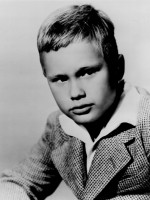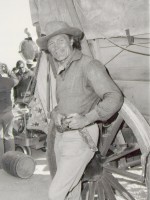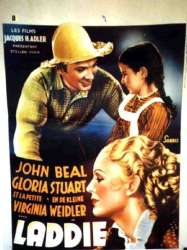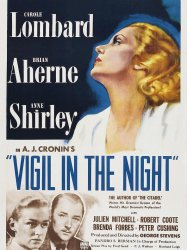Shane is a american film of genre Drama directed by George Stevens released in USA on 23 april 1953 with Alan Ladd
Shane (1953)

If you like this film, let us know!
Shane is a 1953 American Technicolor Western film from Paramount, noted for its landscape cinematography and contributions to the genre.
It was produced and directed by George Stevens from a screenplay by A. B. Guthrie, Jr., based on the 1949 novel of the same name by Jack Schaefer. Its Oscar-winning cinematography was by Loyal Griggs. The film stars Alan Ladd, Jean Arthur (in the last feature, and only color, film of her career) and Van Heflin, and features Brandon deWilde, Elisha Cook, Jr., Jack Palance and Ben Johnson.
Shane was listed No. 45 in the 2007 edition of AFI's 100 Years…100 Movies list, and No. 3 on AFI's 10 Top 10 in the 'Western' category.
Synopsis
Shane (Alan Ladd), a skilled, laconic gunslinger with a mysterious past, rides out of the desert and into an isolated valley in the sparsely settled state of Wyoming some time after enactment of the Homestead Act of 1862. At dinner with a pioneer homesteader, Joe Starrett (Van Heflin) and his wife, Marian (Jean Arthur), he learns that a war of intimidation is being waged on the valley's homesteaders. The ruthless cattle baron Rufus Ryker (Emile Meyer) is trying to run them out and seize their land. Starrett offers Shane a job, and he accepts.Actors

Alan Ladd
(Shane)

Jean Arthur
(Marian Starrett)

Van Heflin
(Joe Starrett)

Brandon deWilde
(Joey Starrett)

Jack Palance
(Jack Wilson)
Comments
Leave comment :
Suggestions of similar film to Shane
There are 265 films with the same actors, 28 films with the same director, 76248 with the same cinematographic genres (including 164 with exactly the same 4 genres than Shane), to have finally 70 suggestions of similar films.If you liked Shane, you will probably like those similar films :

The Talk of the Town (1942)
, 1h58Directed by George Stevens, Earl Bellamy
Origin USA
Genres Drama, Thriller, Comedy, Comedy-drama, Romantic comedy, Romance
Actors Cary Grant, Jean Arthur, Ronald Colman, Rex Ingram, Edgar Buchanan, Charles Dingle
Rating74%





Mill worker and political activist Leopold Dilg (Cary Grant) is accused of burning down a mill and causing the death of a foreman in the fire. In the middle of his trial, Dilg escapes from jail and seeks shelter in a house owned by former schoolmate Nora Shelley (Jean Arthur), now a schoolteacher on whom he has had a crush for years. Shelley has the house rented for the summer to distinguished law professor Michael Lightcap (Ronald Colman), who plans to write a book. Both Lightcap and Dilg arrive within minutes of each other.

The More the Merrier (1943)
, 1h44Directed by George Stevens, Budd Boetticher
Origin USA
Genres War, Comedy, Romantic comedy, Romance
Themes Political films
Actors Jean Arthur, Joel McCrea, Charles Coburn, Richard Gaines, Bruce Bennett, Frank Sully
Rating75%





During World War II, retired millionaire Benjamin Dingle (Charles Coburn) arrives in Washington, D.C. as an adviser on the housing shortage and finds that his hotel suite will not be available for two days. He sees an ad for a roommate and talks the reluctant young woman, Connie Milligan (Jean Arthur), into letting him sublet half of her apartment. Comedy ensues when the two clumsily get in each other's way while arising and preparing for work. Connie makes things work by keeping to an exacting schedule, including eating breakfast and leaving for work at precise times. Then Dingle runs into Sergeant Joe Carter (Joel McCrea), who has no place to stay while he waits to be shipped overseas. Dingle generously rents him half of his half.

Gunga Din (1939)
, 1h57Directed by Robert Parrish, George Stevens
Origin USA
Genres Drama, War, Comedy, Action, Adventure
Themes Poésie, Political films, Adaptation d'un poème
Actors Cary Grant, Victor McLaglen, Douglas Fairbanks, Jr., Eduardo Ciannelli, Sam Jaffe, Joan Fontaine
Rating71%





On the Northwest Frontier of India, circa 1880, contact has been lost with a British outpost at Tantrapur in the midst of a telegraph message. Colonel Weed (Montagu Love) dispatches a detachment of 25 British Indian Army troops to investigate, led by three sergeants of the Royal Engineers, MacChesney (Victor McLaglen), Cutter (Cary Grant), and Ballantine (Douglas Fairbanks, Jr.), long-time friends and veteran campaigners. Although they are a disciplinary headache for their colonel, they are the right men to send on a dangerous mission. Accompanying the detail are six Indian camp workers, including regimental bhisti (water carrier) Gunga Din (Sam Jaffe), who longs to throw off his lowly status and become a soldier of the Queen.

Giant (1956)
, 3h21Directed by Fred Guiol, George Stevens
Origin USA
Genres Drama, Action, Romance, Western
Themes Films about families, Films about racism
Actors Elizabeth Taylor, Rock Hudson, James Dean, Carroll Baker, Nick Adams, Mercedes McCambridge
Rating75%





The movie follows a Texas family over a quarter century from the 1920s until after World War II. Themes of discrimination along race, class and gender lines, as well as the role they played in the social evolution of post-war Texas, are prominent.

Annie Oakley (1935)
, 1h30Directed by George Stevens
Origin USA
Genres Drama, Biography, Comedy, Action, Western
Themes Circus films
Actors Barbara Stanwyck, Preston Foster, Melvyn Douglas, Moroni Olsen, Pert Kelton, Andy Clyde
Rating65%





In late 1800s Ohio, a young woman from the backwoods, Annie Oakley (Stanwyck) delivers six dozen quail she has shot to the owner of the general store. He sends them to the MacIvor hotel in Cincinnati, where the mayor is holding a large banquet in honor of Toby Walker (Foster), the "greatest shot in the whole world". Walker is particular about what he eats–the hotel owner (James MacIvor, played by Andy Clyde) bought Oakley's quail because she shoots the quail cleanly through the head, leaving no buckshot elsewhere.

The Diary of Anne Frank (1959)
, 2h55Directed by Nina Foch, George Stevens, David S. Hall
Origin USA
Genres Drama, Biography, Comedy, Historical, Romance
Themes Films about religion, Théâtre, Political films, Films about Jews and Judaism, Films based on plays, Children's films
Actors Douglas Spencer, Millie Perkins, Lou Jacobi, Joseph Schildkraut, Shelley Winters, Richard Beymer
Rating73%





In 1945, as a truckload of war survivors stops in front of an Amsterdam factory at the end of World War II, Otto Frank (Joseph Schildkraut) gets out and walks inside. After climbing the stairs to a deserted garret, Otto finds a girl's discarded glove and sobs, then is joined and comforted by Miep Gies (Dodie Heath) and Mr. Kraler (Douglas Spencer), factory workers who shielded him from the Nazis. After stating that he is now all alone, Otto begins to search for the diary written by his youngest daughter, Anne. Miep promptly retrieves the journal for Otto, and he receives solace reading the words written by his young daughter three years earlier.

Laddie (1935)
, 1h10Directed by George Stevens
Origin USA
Genres Drama
Actors John Beal, Gloria Stuart, Virginia Weidler, Donald Crisp, Dorothy Peterson, Willard Robertson
Rating60%






Keeper of the Flame (1943)
, 1h40Directed by George Stevens, George Cukor
Origin USA
Genres Drama, Thriller
Actors Spencer Tracy, Katharine Hepburn, Richard Whorf, Margaret Wycherly, Forrest Tucker, Darryl Hickman
Rating66%





When national hero Robert Forrest is killed in an automobile accident, the entire United States goes into deep mourning. Admirer and renowned journalist Stephen O'Malley (Spencer Tracy) returns from Europe to write a biography of the great man. Among the throngs covering the funeral, he finds his old friends and fellow reporters, Jane Harding (Audrey Christie) and Freddie Ridges (Stephen McNally). They remain after the rest of the press leave.

Quality Street (1937)
, 1h23Directed by George Stevens
Origin USA
Genres Drama, Comedy, Comedy-drama, Romance
Themes Films based on plays
Actors Katharine Hepburn, Franchot Tone, Eric Blore, Fay Bainter, Cora Witherspoon, Florence Lake
Rating61%





In 1805 England, eligible bachelors are scarce on Quality Street. Twenty-year-old Phoebe Throssel (Hepburn) becomes very hopeful when one of the few, Dr. Valentine Brown (Tone), tells her he has something important to say to her that day. Both she and her older sister Susan believe he will propose. However, he informs her that he has enlisted in the army to fight in the Napoleonic Wars. Phoebe hides her devastation so well that Dr. Brown never suspects she is deeply in love with him. She gives up hope of ever marrying. By contrast, the Throssels' servant Patty, though she is a decade older and aware she is no beauty, is confident that she will get a man.

Vigil in the Night (1940)
, 1h42Directed by George Stevens
Origin USA
Genres Drama, Romance
Themes Medical-themed films
Actors Carole Lombard, Brian Aherne, Anne Shirley, Robert Coote, Peter Cushing, Ethel Griffies
Rating66%





In Great Britain, Vigil in the Night nurse Anne Lee (Carole Lombard) takes the blame for a fatal error made by her sister Lucy (Anne Shirley), also a nurse, and is forced to leave the hospital where they both work. She moves to a large city where she procures a job at another hospital and falls in love with Dr. Robert Prescott (Brian Aherne). Overcoming obstacles and personal tragedy along the way, Anne and Prescott work together to bring about better conditions for the care of the sick as well as fighting an epidemic which threatens to overwhelm all those around them.
 Connection
Connection